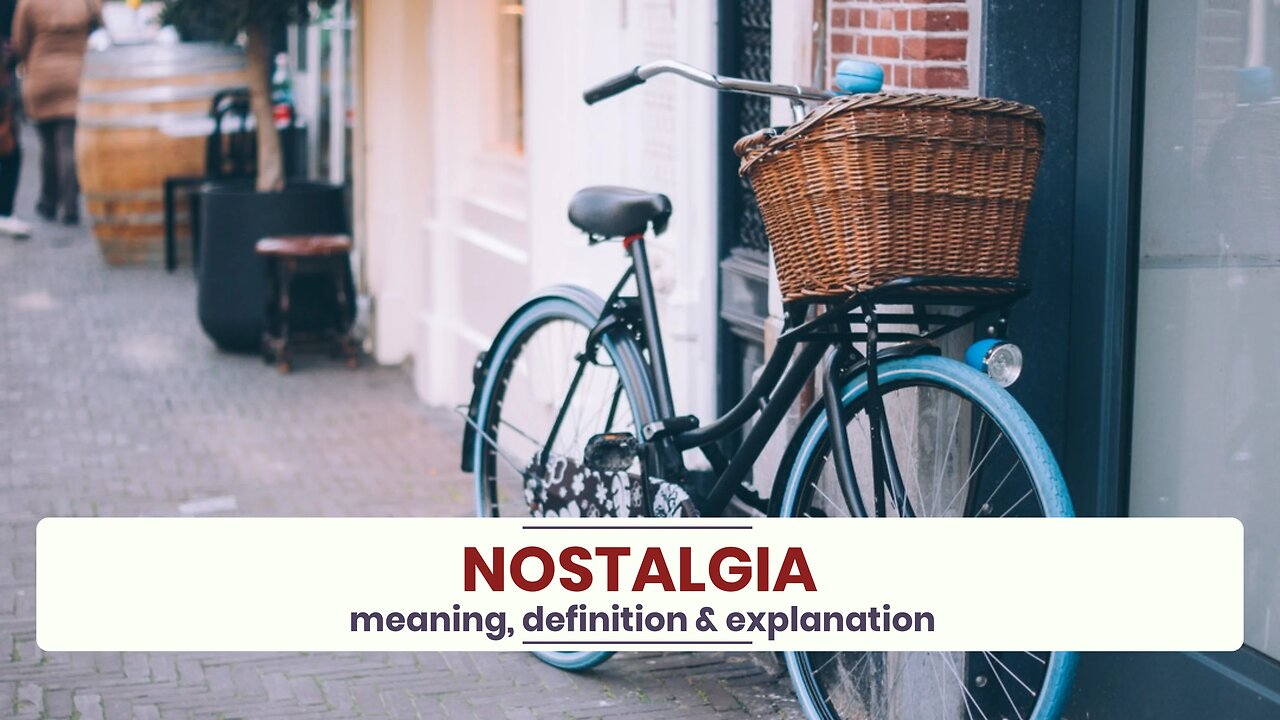Premium Only Content

What is NOSTALGIA?
✪✪✪✪✪
http://www.theaudiopedia.com
✪✪✪✪✪
What does NOSTALGIA mean? NOSTALGIA meaning - NOSTALGIA definition - NOSTALGIA explanation. What is the meaning of NOSTALGIA? What is the definition of NOSTALGIA? What does NOSTALGIA stand for? What is NOSTALGIA meaning? What is NOSTALGIA definition?
Nostalgia is a sentimentality for the past, typically for a period or place with happy personal associations. Described as a medical condition—a form of melancholy—in the Early Modern period, it became an important trope in Romanticism.
Nostalgia can refer to a general interest in the past, its personalities, and events, especially the "good old days" from earlier in one's life.
The scientific literature on nostalgia usually refers to nostalgia regarding the personal life and has mainly studied the effects of nostalgia induced during the studies. Smell and touch are strong evokers of nostalgia due to the processing of these stimuli first passing through the amygdala, the emotional seat of the brain. These recollections of one's past are usually important events, people one cares about, and places where one has spent time. Music and weather can also be strong triggers of nostalgia. Nostalgic preferences, the belief that the past was better than is the present, has been linked to biases in memory.
Nostalgia's definition has changed greatly over time. Consistent with its Greek word roots meaning "homecoming" and "pain," nostalgia was for centuries considered a potentially debilitating and sometimes fatal medical condition expressing extreme homesickness. The modern view is that nostalgia is an independent, and even positive, emotion that many people experience often. Occasional nostalgia has been found to have many functions, such as to improve mood, increase social connectedness, enhance positive self-regard, and provide existential meaning. Many nostalgic reflections serve more than one function, and overall seem to benefit those who experience them. Such benefits may lead to a chronic disposition or personality trait of "nostalgia proneness."
Although nostalgia is often triggered by negative feelings, it results in increasing one's mood and heightening positive emotions, which can stem from feelings of warmth or coping resulting from nostalgic reflections. One way to improve mood is to effectively cope with problems that hinder one's happiness. Batcho (2013) found that nostalgia proneness positively related to successful methods of coping throughout all stages—planning and implementing strategies, and reframing the issue positively. These studies led to the conclusion that the coping strategies that are likely among nostalgia prone people often lead to benefits during stressful times. Nostalgia can be connected to more focus on coping strategies and implementing them, thus increasing support in challenging times.
Nostalgia also revolves typically around memories with close others, and thus it increases one's sense of social support and connections. Nostalgia is also triggered specifically by feelings of loneliness, but counteracts such feelings with reflections of close relationships. According to Zhou et al. (2008), lonely people often have lesser perceptions of social support. Loneliness, however, leads to nostalgia, which actually increases perceptions of social support. Thus, Zhou and colleagues (2008) concluded that nostalgia serves a restorative function for individuals regarding their social connectedness.
Nostalgia serves as a coping mechanism and helps people to feel better about themselves. Vess et al. (2012) found that the subjects who thought of nostalgic memories showed a greater accessibility of positive characteristics than those who thought of exciting future experiences. Additionally, in a second study conducted, some participants were exposed to nostalgic engagement and reflection while the other group was not. The researchers looked again at self-attributes and found that the participants who were not exposed to nostalgic experiences reflected a pattern of selfish and self-centered attributes. Vess et al. (2012), however, found that this effect had weakened and become less powerful among the participants who engaged in nostalgic reflection.
-
 1:41
1:41
The Audiopedia
10 months agoWhat is PUBLIC DEBT?
53 -
 2:48:37
2:48:37
TimcastIRL
4 hours agoDoD Branch Chief GOES ROGUE, Vows To RESIST Trump, Tulsi Refers Leakers For PROSECUTION |Timcast IRL
156K134 -
 1:04:56
1:04:56
Man in America
8 hours agoWAIT!? China's Population is LESS THAN 500M? Expert Reveals SHOCKING Data
25.8K23 -
 LIVE
LIVE
RalliedLIVE
7 hours ago $0.29 earnedWednesday Warzone Special w/ Rallied
472 watching -
 3:19:56
3:19:56
Fragniac
5 hours ago🔴FORTNITE w/ The BRRRAP PACK ( -_•)╦ ╤─💥
12.3K -
 LIVE
LIVE
I_Came_With_Fire_Podcast
11 hours agoLOWERING THE TARIFFS | THE HEGSETH SIGNAL | RUNNING TREN
337 watching -
 9:34:32
9:34:32
Dr Disrespect
12 hours ago🔴LIVE - DR DISRESPECT - WARZONE - HOW TO WIN SOLO GAMES
174K18 -
 LIVE
LIVE
TheNateVibez
4 hours agoRisking it all to save Tamriel and it's people✌ || Agent of the Nine⚔
98 watching -
 24:19
24:19
BlackDiamondGunsandGear
23 hours agoAnderson Frontline / Can it take 1000 Rnds in One Day?
10.9K4 -
 DVR
DVR
mrsZWOGs
3 hours ago🟢✨ GAMING WITH MRSZWOGS! - Variety Games | Disney Dreamlight Wonderland Update
6.5K